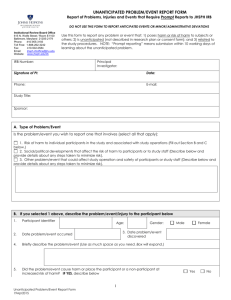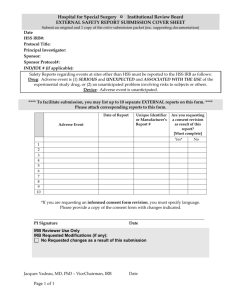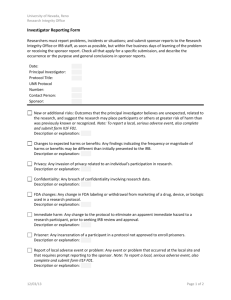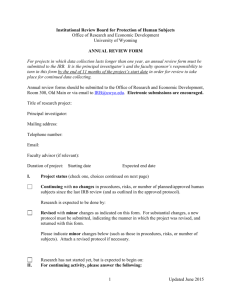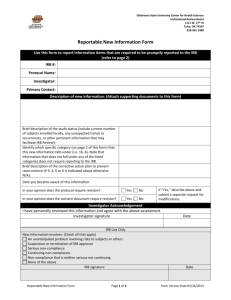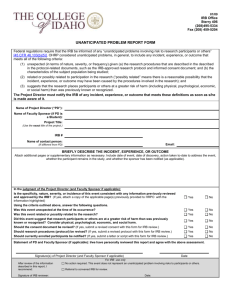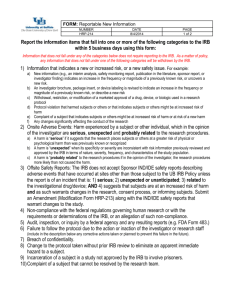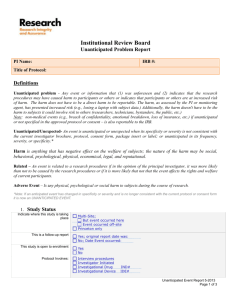The Christ Hospital Institutional Review Board
advertisement
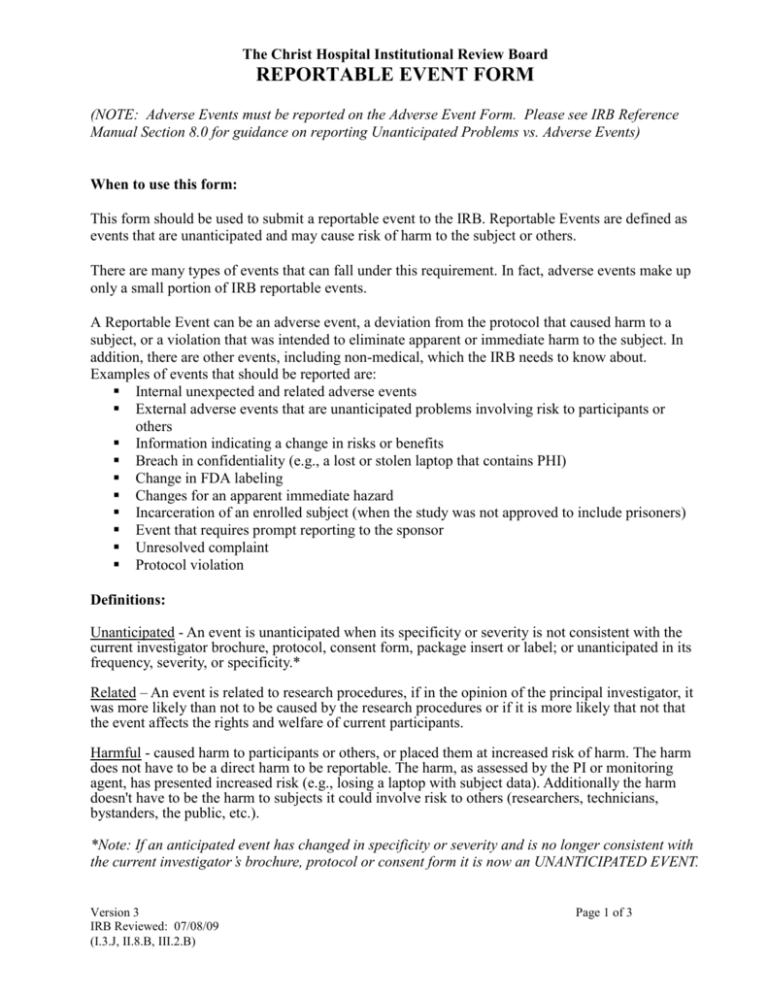
The Christ Hospital Institutional Review Board REPORTABLE EVENT FORM (NOTE: Adverse Events must be reported on the Adverse Event Form. Please see IRB Reference Manual Section 8.0 for guidance on reporting Unanticipated Problems vs. Adverse Events) When to use this form: This form should be used to submit a reportable event to the IRB. Reportable Events are defined as events that are unanticipated and may cause risk of harm to the subject or others. There are many types of events that can fall under this requirement. In fact, adverse events make up only a small portion of IRB reportable events. A Reportable Event can be an adverse event, a deviation from the protocol that caused harm to a subject, or a violation that was intended to eliminate apparent or immediate harm to the subject. In addition, there are other events, including non-medical, which the IRB needs to know about. Examples of events that should be reported are: Internal unexpected and related adverse events External adverse events that are unanticipated problems involving risk to participants or others Information indicating a change in risks or benefits Breach in confidentiality (e.g., a lost or stolen laptop that contains PHI) Change in FDA labeling Changes for an apparent immediate hazard Incarceration of an enrolled subject (when the study was not approved to include prisoners) Event that requires prompt reporting to the sponsor Unresolved complaint Protocol violation Definitions: Unanticipated - An event is unanticipated when its specificity or severity is not consistent with the current investigator brochure, protocol, consent form, package insert or label; or unanticipated in its frequency, severity, or specificity.* Related – An event is related to research procedures, if in the opinion of the principal investigator, it was more likely than not to be caused by the research procedures or if it is more likely that not that the event affects the rights and welfare of current participants. Harmful - caused harm to participants or others, or placed them at increased risk of harm. The harm does not have to be a direct harm to be reportable. The harm, as assessed by the PI or monitoring agent, has presented increased risk (e.g., losing a laptop with subject data). Additionally the harm doesn't have to be the harm to subjects it could involve risk to others (researchers, technicians, bystanders, the public, etc.). *Note: If an anticipated event has changed in specificity or severity and is no longer consistent with the current investigator’s brochure, protocol or consent form it is now an UNANTICIPATED EVENT. Version 3 IRB Reviewed: 07/08/09 (I.3.J, II.8.B, III.2.B) Page 1 of 3 The Christ Hospital Institutional Review Board REPORTABLE EVENT FORM TCH IRB # PI: Study Title: Phone: Report Date: Subject ID: Initial Report Event Date: Date of Site’s Awareness: Follow-up Report Criteria: Does the event being reported meet all of the following criteria? Check Yes or No. Y N Unexpected (in terms of nature, severity, or frequency) given (a) the research procedures that are described in the protocol related documents, such as the IRB-approved research protocol and informed consent form; and (b) the characteristics of the subject population being studied; Related – or possibly related – to the research procedures; and Suggests that the research places participants or others at a greater risk of harm (including physical, psychological, economic, or social harm) than was previously known or recognized. If all answers are “Yes”, complete this form and forward along with the summary or report from the study Sponsor or DSMB to the IRB Office. 1. Provide a detailed description of the problem/event: Possibly related Probably related Definitely related Does this event alter risk to past, present or future subjects? Yes No Undetermined (Insufficient information) 2. Based on your (the investigator’s) judgment, should this problem/event be added to the consent form as a potential risk? Yes Provide revised consent form with changes highlighted. No Explain why not: 3. Based on your (the investigator’s) analysis of this event, should currently enrolled subjects be notified? Yes No 4. Should subjects who’ve completed the study be notified? Explain: Version 3 IRB Reviewed: 07/08/09 (I.3.J, II.8.B, III.2.B) Yes No Page 2 of 3 5. This event has been reported (check all that apply): By sponsor, DSMB, or DSM, or Medical Monitor to PI By PI to Sponsor By PI to DSMB/DSM/Medical Monitor By PI to FDA (for IND/IDE study) By PI to the TCH IRB only _______________________________________ Principal Investigator (or Designee) Signature _______________________ Date TCH IRB Use Only Signature of IRB Chair or Designee Date Assessments: The information in this report is not expected given the nature of the research procedures and the subject population being studied. True False The information in this report suggests that the research places the subjects or others at greater risk of harm or discomfort related to the research than was previously known. True False Recommendation: The reported problem does not represent an unanticipated problem involving risks to subjects or others (One or both assessments above are False). No further action is required by the IRB. PI to include problem with the Continuing Review Report The reported problem represents or may represent an unanticipated problem involving risk to subjects or others (Both assessments above are True). The problem is to be referred to the convened IRB for review and reported to regulatory agencies and the Institutional Official. Version 3 IRB Reviewed: 07/08/09 (I.3.J, II.8.B, III.2.B) Page 3 of 3
